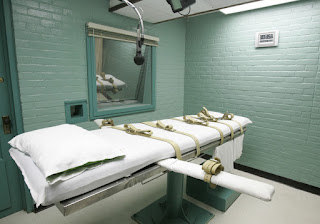 |
| VPB contact page |
- University of Vermont criminologist Kathy Fox
The following is by an anonymous inmate at one of our Virginia prisons:
Many cases of error and confusion have surfaced in the activities of the Virginia Parole Board.
1. Parole-eligible prisoners have received a one-year deferral only to find out later that it had been changed by the VPB to a three-year deferral.
2. Some parole-eligible prisoners have received parole denials even BEFORE speaking to the parole interviewer. This suggests that parole NOT GRANTS are set to be sent by the computer automatically on a specific programmed date along with the programmed digital signature from the Parole Chairwoman, Ms. Karen Brown. It also seems that the reasons are routinely copied from the previous years Not Grant form letter.
3. Virginia Parole Board has been known to make clerical errors. Clearly, there should be no room for carelessness where the fates of real people are at stake. How many pages are misfiled? How do parole-eligible prisoners know that what is in their VPB files are accurate?
4. Virginia Parole Board has listed on its database names of prisoners who are not old enough to have been under the old parole law before parole was abolished (in 1995). Are the numbers being fudged? The Board should only have on that database those sentenced prior to July 1, 1995 or set up a column listing who are old-law and who are new-law or juvenile inmates.
Parole-eligible prisoners should be allowed to review their parole files and refute any erroneous information that could have been placed in their files by accident or by malicious intent.
VPB's examiners, Board members and staff have proven in the past to be biased, perhaps without even realizing it, especially if one of their family members or friends had been victimized by a sexual or violent person in the past. Also, they often become casehardened after decades of work and their dedication in the "war on crime" and tend to build up a hostile and cynical mindset that cannot be changed overnight.
Every board member, examiner and staff member of the Parole Board should be impartial and unbiased in order for fair and effective justice to be served. Many parole-eligible prisoners have come to the conclusion that, no matter what is discussed at the examination, the examiner's impact on the Board's decisions is negligible. Then why keep having the same costly and useless examinations year after year?
The Board's unprofessional actions include the following:
1. In denying parole, VPB routinely gives the following reasons, all of which have to do with past behavior no inmate can change:
a. The serious nature and circumstances of your offense(s)
b. Release at this time would diminish the seriousness of the crime
c. The Board has concluded that you should serve more of your sentence prior to release on parole
The General Assembly passed Code of Virginia § 53.1-151, "Eligibility for Parole". Lines 1-4 state how much time should be served by parole-eligible prisoners before being granted release on parole. Ironically it turns out that all first time offenders have served double the time mandated by the General Assembly.
2. Another reason often provided by the Virginia Parole Board in its "Not Grant" form letters is:
The Board considers you to be a risk to the community
Clearly, anybody can snap and commit a violent crime, not just paroled ex-felons (Look at the recent murders and assaults even by police officers). But unlike many young people roaming the streets, most paroled ex-offenders are no longer rowdy youths. Many have matured, have learned to control their anger and emotions, and have learned to adapt to their surroundings and to coexist peacefully in violent and drug infested prison communities where they have lived for decades behind prison fences.
3. The Virginia law that the VPB cites on the parole "Not Grant" form letters is Code of Virginia § 53.1-155, "No person shall be released on parole by the Board until a thorough investigation has been made into the prisoner's history, physical and mental condition and character and his conduct, employment and attitude WHILE IN PRISON [emphasis added]. The Board shall also determine that his release on parole will not be incompatible with the interests of society OR OF THE PRISONER [emphasis added]."
The problem is that the Board totally disregards the interests, and even the rights, of parole-eligible prisoners.
Virginia Parole Board's Mission Statement as formulated in its Agency Strategic Plan, proclaims that its goal is to "Contribute to a fair and effective justice system" and that "those who no longer present a risk are released to become productive citizens".
Why then are so many model prisoners still routinely denied parole release, while some who have had previous parole violations and frequent infractions in prison been granted release?
We suggest supplementing Virginia Parole Board's decision-making functions with computer software designed to help make parole decisions that would be consistent statewide and free of subjectivity, emotions and political motives. It is high time VPB entered the twenty-first century and started using modern information technology instead of allowing personal feelings to get in their way of sound professional judgement.
Most correctional professionals agreed that prisoners require a strong support network, both inside and outside of prison, to encourage positive change and keep them from relapsing into old criminal behaviors. This is particularly true of prisoners who have been incarcerated since their youth and have never developed life competencies. What often happens, though, is that VPB continues denying them parole grant until their loved ones have given up on them or have died, leaving no one to help them get reestablished in society.
In conclusion, the above facts demonstrate that VPB seems to be going to extreme lengths to avoid doing its job - namely, that of releasing parole-eligible Prisoners back into society. The Board's overly cautious and punitive approach is proving to be ineffective in combating recidivism.











